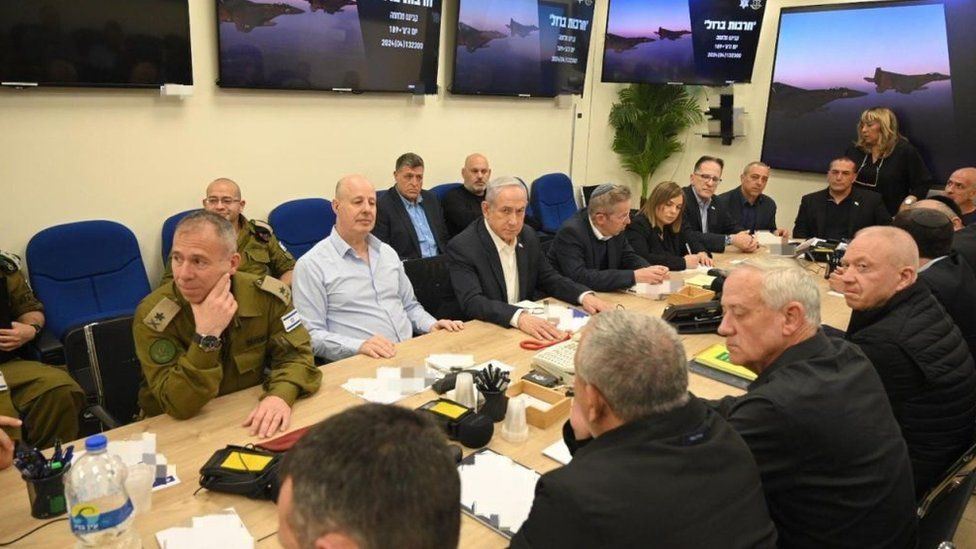ARTICLE AD BOX
 Image source, Israeli government handout
Image source, Israeli government handout
The war cabinet also met on Sunday, as seen in this Israeli government handout
Israel's war cabinet has met to discuss its response to Iran's unprecedented drone and missile attack.
Israel did not make public whether a decision had been reached.
Its allies have strongly condemned Iran's actions, but urged Benjamin Netanyahu's government to show restraint.
While Iran has signalled it considers the matter closed, the Israeli military's chief of staff said the attack would not go unanswered.
"Look, as we look forward, we weigh our steps, and this launch of so many missiles, cruise missiles, UAVs to the territory of the State of Israel will be met with a response," Lt Gen Herzi Halevi said.
He did not specify a course of action, or give a timescale.
Analysts say Israel might decide to carry out a limited attack, such as a major cyberattack, or a strike on infrastructure with a low risk of casualties, calculated not to provoke a military response by Iran but to send a clear signal - or something far more extensive.
Lt Gen Halevi was speaking from Nevatim air base in southern Israel, which sustained damage in Saturday's overnight attack but was said by Israel to be "still functioning".
Tehran said the operation was retaliation for a 1 April strike on its consulate in Syria, which killed senior Iranian military commanders.
The Israeli military said more than 300 drones and missiles were launched at Israel. It said almost all were brought down by its forces, with support from the US, UK, France and other countries, before reaching their targets. No deaths were reported and Israel said the damage was limited.
World leaders have urged restraint amid concerns about a major escalation in tensions in the Middle East.
US President Joe Biden spoke to Mr Netanyahu following the launch of the Iranian attack and reaffirmed "America's ironclad commitment to the security of Israel".
But on Sunday the US told Israel it would not join in any counter-strike on Iran, according to a senior White House official.
"We're committed to a ceasefire that will bring the hostages home and prevent the conflict spreading more than it already has," Mr Biden said on Monday, referring to the 130 hostages still in Gaza who were abducted from Israel on 7 October, and Israel's subsequent military operation which has killed tens of thousands of Palestinians.
Addressing Iran-Israel tensions in the UK Parliament on Monday, British Prime Minister Rishi Sunak called on "all sides" to "show restraint". He added that he would speak to Mr Netanyahu to express solidarity and discuss how to prevent "further escalation".
Separately on Monday, violence continued to surge in the occupied West Bank following the killing of an Israeli teenager, Benjamin Achimeir.
He had taken a flock of sheep out to graze from a settler outpost near Ramallah when he went missing on Friday last week. The Israel Defence Forces later found his body.
The Israeli government has said he was the victim of a "terrorist attack".
The US has condemned retaliatory violence by Israeli settlers, including the killings of two young Palestinians, Jihad Abu Aliya and Omar Ahmad Abdulghani Hamed.
On Monday, Israel said it would investigate the killings of two more Palestinians near the city of Nablus, apparently by Israeli settlers.

 1 year ago
66
1 year ago
66








 English (US) ·
English (US) ·